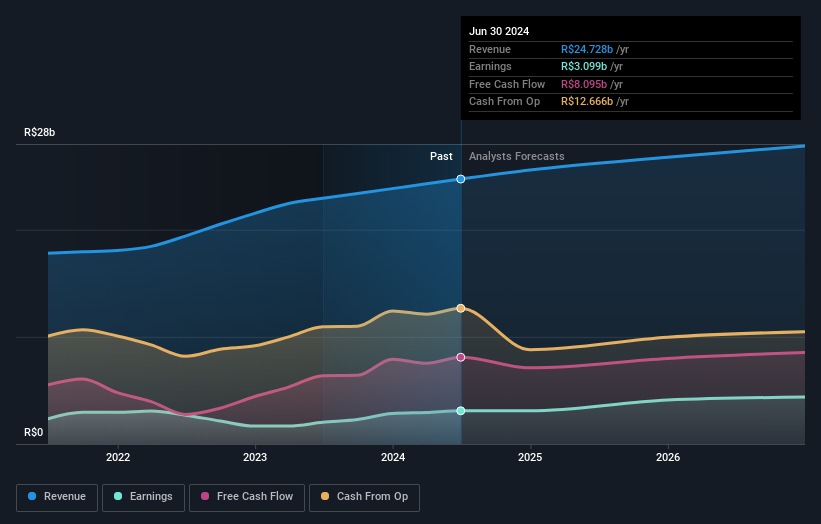- Brazil
- /
- Wireless Telecom
- /
- BOVESPA:TIMS3
TIM S.A. Just Beat EPS By 7.1%: Here's What Analysts Think Will Happen Next

It's been a good week for TIM S.A. (BVMF:TIMS3) shareholders, because the company has just released its latest quarterly results, and the shares gained 6.7% to R$17.49. The result was positive overall - although revenues of R$6.3b were in line with what the analysts predicted, TIM surprised by delivering a statutory profit of R$0.32 per share, modestly greater than expected. Following the result, the analysts have updated their earnings model, and it would be good to know whether they think there's been a strong change in the company's prospects, or if it's business as usual. We thought readers would find it interesting to see the analysts latest (statutory) post-earnings forecasts for next year.
See our latest analysis for TIM

After the latest results, the twelve analysts covering TIM are now predicting revenues of R$25.6b in 2024. If met, this would reflect a satisfactory 3.4% improvement in revenue compared to the last 12 months. Before this earnings report, the analysts had been forecasting revenues of R$25.5b and earnings per share (EPS) of R$1.38 in 2024. So we can see that while the consensus made no real change to its revenue estimates, it also no longer provides an earnings per share estimate. This suggests that revenues are what the market is focusing on after the latest results.
There's been no real change to the consensus price target of R$21.27, with TIM seemingly executing in line with expectations. The consensus price target is just an average of individual analyst targets, so - it could be handy to see how wide the range of underlying estimates is. The most optimistic TIM analyst has a price target of R$24.00 per share, while the most pessimistic values it at R$18.00. Even so, with a relatively close grouping of estimates, it looks like the analysts are quite confident in their valuations, suggesting TIM is an easy business to forecast or the the analysts are all using similar assumptions.
One way to get more context on these forecasts is to look at how they compare to both past performance, and how other companies in the same industry are performing. The period to the end of 2024 brings more of the same, according to the analysts, with revenue forecast to display 6.9% growth on an annualised basis. That is in line with its 8.5% annual growth over the past five years. Compare this with the broader industry, which analyst estimates (in aggregate) suggest will see revenues grow 4.8% annually. So although TIM is expected to maintain its revenue growth rate, it's definitely expected to grow faster than the wider industry.
The Bottom Line
The most important thing to take away is that the analysts reconfirmed their revenue estimates for next year, suggesting that the business is performing in line with expectations. Fortunately, they also reconfirmed their revenue numbers, suggesting that it's tracking in line with expectations. Additionally, our data suggests that revenue is expected to grow faster than the wider industry. There was no real change to the consensus price target, suggesting that the intrinsic value of the business has not undergone any major changes with the latest estimates.
At least one of TIM's twelve analysts has provided estimates out to 2026, which can be seen for free on our platform here.
We don't want to rain on the parade too much, but we did also find 1 warning sign for TIM that you need to be mindful of.
Valuation is complex, but we're here to simplify it.
Discover if TIM might be undervalued or overvalued with our detailed analysis, featuring fair value estimates, potential risks, dividends, insider trades, and its financial condition.
Access Free AnalysisHave feedback on this article? Concerned about the content? Get in touch with us directly. Alternatively, email editorial-team (at) simplywallst.com.
This article by Simply Wall St is general in nature. We provide commentary based on historical data and analyst forecasts only using an unbiased methodology and our articles are not intended to be financial advice. It does not constitute a recommendation to buy or sell any stock, and does not take account of your objectives, or your financial situation. We aim to bring you long-term focused analysis driven by fundamental data. Note that our analysis may not factor in the latest price-sensitive company announcements or qualitative material. Simply Wall St has no position in any stocks mentioned.
Have feedback on this article? Concerned about the content? Get in touch with us directly. Alternatively, email editorial-team@simplywallst.com
About BOVESPA:TIMS3
TIM
A telecommunications company, provides mobile, fixed, long-distance, data transmission, and broadband services in Brazil.
Solid track record and fair value.
Similar Companies
Market Insights
Community Narratives




